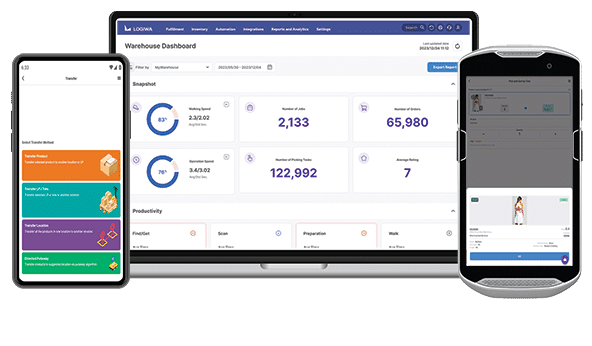Perhaps you’ve had your warehouse up and running for several years, or maybe you’re just getting set up. You’ve been researching ways to make your operations as efficient and scalable as possible. You’ve come across two concepts: warehouse management system (WMS) software and enterprise resource planning (ERP) software. Both are the backbone of any distribution and wholesale business, but when it comes to WMS vs ERP which one is right for your operation?
Let’s look at the similarities and differences between ERP and WMS, to help determine the system that might be the best for you.
Contents
What is WMS?
Warehouse management systems—what we at Logiwa specialize in—are used to manage the movement and storage of inventory within a warehouse. Effective WMS software will track the movement of each item in your warehouse, from receiving and putaway to picking, packing, and shipping. A good WMS can also provide reports and insights on how you can optimize inventory movement within your warehouse based on real-time information.
What is ERP?
Enterprise resource planning systems have some warehouse management capabilities but not at the same level as a complete WMS. ERPs can automate all business processes across all departments of your business, including accounting, order entry and processing, purchasing, inventory management, warehouse management, ecommerce integration, and customer relationship services. In short, an ERP system facilitates the flow of information between all functional areas of a business.
Some ERPs may have limited warehouse and inventory management capabilities, but not to the same extent as dedicated WMS software. According to Gartner, ERP software allows you to automate and support a range of administrative and operational processes, including the customer-facing, administrative, and asset management aspects of your organization.

Pros and Cons of WMS
Like any software system and your business needs, a warehouse management system will have pros and cons. Let’s explore a few of them.
Benefits of WMS
Suppose your organization is focused mainly on receiving, storing, and shipping inventory. In that case, WMS software, vs ERP software, may be the best fit for you. This software will allow you to:
- Set up stocking and non-stocking locations to show the actual count of your inventory.
- Separate available product from product already allocated to an existing order.
- Set up stocking location priorities for more efficient picking.
- Speed up job picking by grouping jobs with identical items with smart picking.
- Create optimized walking paths to reduce the time needed to complete an order.
- Provide precise movement tracking of every item in your warehouse, from shelf to cart to packing station and out the door.
- Plan your warehouse layout of ultimate efficiency.
Drawbacks of WMS
One of the primary drawbacks of WMS software vs ERP software is in its name: it’s designed for warehouse management only. It can’t manage other aspects of a business, such as accounting or customer relationship management. However, many warehouse management systems, including Logiwa’s, can be integrated with ERP systems, including QuickBooks, NetSuite, SAP, and Xorosoft.
Pros and Cons of ERP
If warehouse operations are one part of a larger organization, ERP software may be the better choice for you.
Benefits of ERP
Choosing an ERP over a WMS may be a wise choice if you are looking for inventory management, accounting, order entry, contract management, and customer service functionality. Many ERPs will have some level of WMS functionality but on a smaller scale.
Other benefits of an ERP system include:
- Barcode scanning and mobile picking capabilities
- Order entry and invoicing
- Creation of purchase orders
- Contract management
- Inventory management
- Standard and customized reporting features
Drawbacks of ERP
Many ERPs need to be integrated with ecommerce platforms, which may be an additional cost. Also, the warehouse management functions included in an ERP are pretty limited. If you plan to expand your warehouse operations, you may not be able to do it with an ERP.
WMS vs. ERP – What’s Right for You?
So how do you choose a WMS or an ERP system? Some things to consider with either software are the ease of integration, including training and future upgrades, and whether the system will allow your business to grow. Will you need more WMS functionality in the future beyond what an ERP can offer?
QStock Inventory breaks the decision down quite well:
You should choose a WMS if your business relies on real-time operations or is vulnerable to constant priority changes. A WMS system is better for more complex warehouse and shipping environments. But remember that it is a standalone system that needs support from additional software if you need functionality for accounting, contracts, or customer service management.
Choose an ERP if your operations are very linear, with chronological operations and limited exceptions. Yes, it is an all-in-one solution but may not allow you to scale as your business grows.
If you are interested in learning more about WMS software and how it can help your business now and into the future, contact a member of our sales team and request a demo. Our team will be happy to discuss the features of both systems and which product may be best for you and your operations.
FAQs
What’s the difference between a WMS and an ERP?
WMS stands for warehouse management system and manages the movement and storage of inventory within a warehouse.
ERP stands for enterprise resource planning and can automate all of the business processes across all departments of your business, including accounting, order entry and processing, purchasing, inventory management, warehouse management, ecommerce integration, and customer relationship services.
Do ERPs have warehouse management capabilities?
Enterprise resource planning software has some warehouse management capabilities but won’t allow you to do everything you can do with WMS software. If you are planning for future growth of your warehouse operations, an ERP might not be the ideal tool.
Can a WMS be integrated with an ERP?
Yes, our WMS software can easily be integrated with popular ERPs, including QuickBooks, NetSuite, SAP, and Xorosoft.
Which system is best for my warehouse operations?
If your operations are linear, your processes are done in the same order every time, and your inventory remains the same, an ERP is likely your best choice.
If your operations are subject to constant priority changes and happen in real-time, a WMS is probably the best software for you.





